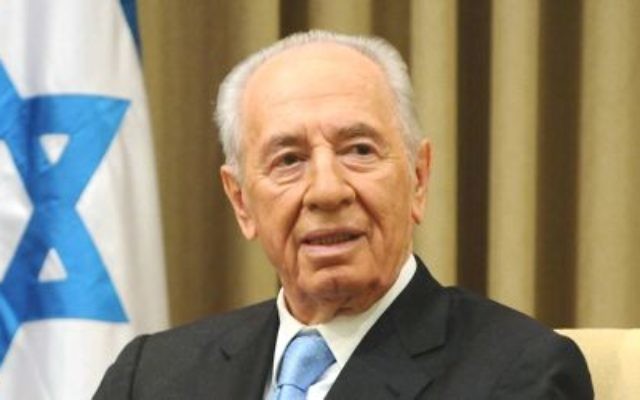Peres takes swipe at Netanyahu
A MAN of conscience admirably speaking his mind, or a political meddler who doesn’t know when to keep his thoughts to himself? This was the question that resounded across Israel this week regarding the country’s President Shimon Peres.
ANALYSIS
A MAN of conscience admirably speaking his mind, or a political meddler who doesn’t know when to keep his thoughts to himself? This was the question that resounded across Israel this week regarding the country’s President Shimon Peres (pictured).
Just three weeks ahead of Israel’s election Peres took what many interpreted as a swipe at Prime Minister and Likud head Benjamin Netanyahu, and his running mate Avigdor Lieberman of Yisrael Beitenu.
Lieberman and Netanyahu have both been exceedingly critical of Palestinian President Mahmoud Abbas recently, claiming that he has acted antagonistically with his role in the statehood bid at the United Nations on November 29 and questioning his value as a partner for peace.
Abbas appears to be “unwilling or unable” to reach a peace agreement, Lieberman wrote to the Mideast Quartet in August, and Netanyahu accused him of “incitement” at the UN.
Publicly taking issue with their position, Peres declared on Sunday to a meeting of diplomats that he is convinced that Abbas, also known as Abu Mazen, is a partner for peace, and said: “I’ve known him for 30 years. No one will change my opinion about Abu Mazen, even if they say I cannot express it because I’m the President.”
He also dismissed one of Netanyahu’s central demands for a peace deal, namely that the Palestinians recognise that Israel is a Jewish state – important to Netanyahu because he sees it as a way of preventing claims in the future that Israel should surrender its Jewish identity.
He attacked the foreign policy of Lieberman, who was foreign minister until last month, saying: “As a diplomat, it’s always better to be a lion in a sheep’s skin, rather than to be a sheep, roaring like a lion, scaring the whole world. The objective of diplomacy is to create friends, not to point out enemies.”
Netanyahu responded on Sunday, evocatively citing the Bible. “In this week’s Torah portion, it says ‘Now there arose a new king over Egypt’ – like then, like today. In Egypt, the regime has been replaced, in Syria the regime is being shaken and this could also happen in the Palestinian Authority areas in Judea and Samaria.”
Connecting his theme to Peres’ comments, he then said: “Therefore, as opposed to the voices that I have heard recently urging me to run forward, make concessions, [and] withdraw, I think that the diplomatic process must be managed responsibly and sagaciously and not in undue haste. Otherwise a third base for Iranian terrorism will arise here, in the heart of the country.”
This is by no means the first Peres-government showdown. Earlier in the year, Peres publicly undermined the government’s position on Iran. But this is actually the bitterest. When he undermined Netanyahu on Iran, it was a disagreement on strategy and timing; this disagreement cuts right to the heart of their divergent views about Israel’s prospects in its region.
To Netanyahu and Lieberman, Abbas is a troublemaker and part of the problem on the Palestinian side; to Peres he represents hope and part of the solution. Or put more simply, the gulf is between pessimism and optimism on the Palestinian issue.
Peres only has around 18 months of his seven-year term left to run, and for those of us who see his appearances up close, it’s clear that he’s aware of this in his manner of talking as well as in what he says. He speaks with more confidence and conviction than ever, sometimes taking public discussions wherever the wind blows him, sometimes veering massively off topic. Now we’re seeing his end-of-term confidence extend to political matters. It looks like this is just the start of Peres speaking his mind – and we’re going to be seeing far more friction between him and Netanyahu.
NATHAN JEFFAY


comments